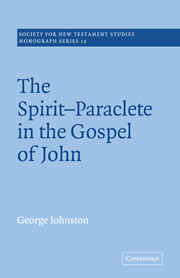Book contents
- Frontmatter
- Contents
- Preface
- Abbreviations
- PART I ‘SPIRIT’ IN THE FOURTH GOSPEL: A GENERAL SURVEY
- PART II THE SPIRIT–PARACLETE, THE SPIRIT OF TRUTH
- 6 Are the Spirit–Paraclete Sayings truly Johannine?
- 7 Recent Studies on Paraclete and the Spirit of Truth
- 8 The Spirit–Paraclete in the Johannine Polemics
- 9 The Presence of the Spirit–Paraclete in the Church
- 10 An Evaluation of Johannine Spirituality
- Appendix 1 The Literary Structure of John
- Appendix 2 Literary Analysis of John 13–17
- Select Bibliography
- Index of Passages cited
- Index of Authors
- Index of Subjects
8 - The Spirit–Paraclete in the Johannine Polemics
Published online by Cambridge University Press: 26 February 2010
- Frontmatter
- Contents
- Preface
- Abbreviations
- PART I ‘SPIRIT’ IN THE FOURTH GOSPEL: A GENERAL SURVEY
- PART II THE SPIRIT–PARACLETE, THE SPIRIT OF TRUTH
- 6 Are the Spirit–Paraclete Sayings truly Johannine?
- 7 Recent Studies on Paraclete and the Spirit of Truth
- 8 The Spirit–Paraclete in the Johannine Polemics
- 9 The Presence of the Spirit–Paraclete in the Church
- 10 An Evaluation of Johannine Spirituality
- Appendix 1 The Literary Structure of John
- Appendix 2 Literary Analysis of John 13–17
- Select Bibliography
- Index of Passages cited
- Index of Authors
- Index of Subjects
Summary
In the remaining chapters of this book the theses to be stated and defended are (1) that the author of the Fourth Gospel combined ‘spirit of truth’ with ‘paraclete’ in a deliberate rebuttal of heretical claims for an angel-intercessor as the spiritual guide and guardian of the Christian Church; and (2) that the spirit–paraclete is the Spirit of God, which is also the Spirit of Christ, and thus an active divine power that becomes embodied in certain outstanding leaders within the catholic Church: the exegete, the teacher and evangelist, the prophet, the consoler out of sorrow, and the witness for the defence in times of persecution.
We may begin by rehearsing some of the positions already occupied (see above, pp. 84–7 and also Part I as a whole).
To discover the full range of Johannine meaning in the case of the ‘spirit’ we must begin with exegesis of the Johannine text; and in so doing we have found that the basic sense of ‘spirit’ is divine power. It is effective in the life of the universe, for it is creative. It is effective in the life of humanity, but by way of mystery, since it shares in all the wonder and grace of God himself from whom it proceeds, God the loving Father proclaimed by the Lord Jesus: so some men see but do not perceive, they hear but do not understand (Isa. 6: 10; John 12: 40). Yet the spirit moves in the midst of their time to accomplish the purposes of God and, as it were, ‘blows’ where it will.
- Type
- Chapter
- Information
- The Spirit-Paraclete in the Gospel of John , pp. 119 - 126Publisher: Cambridge University PressPrint publication year: 1970



